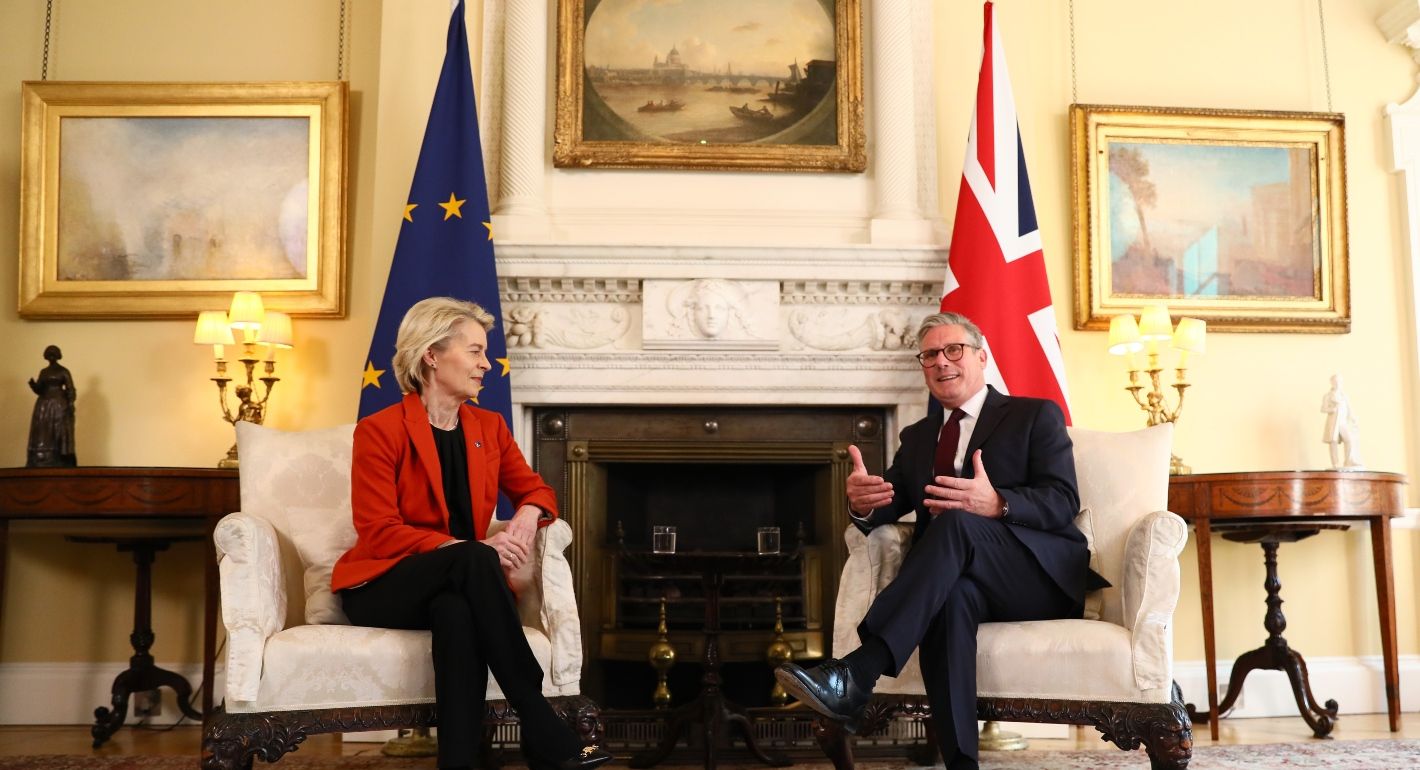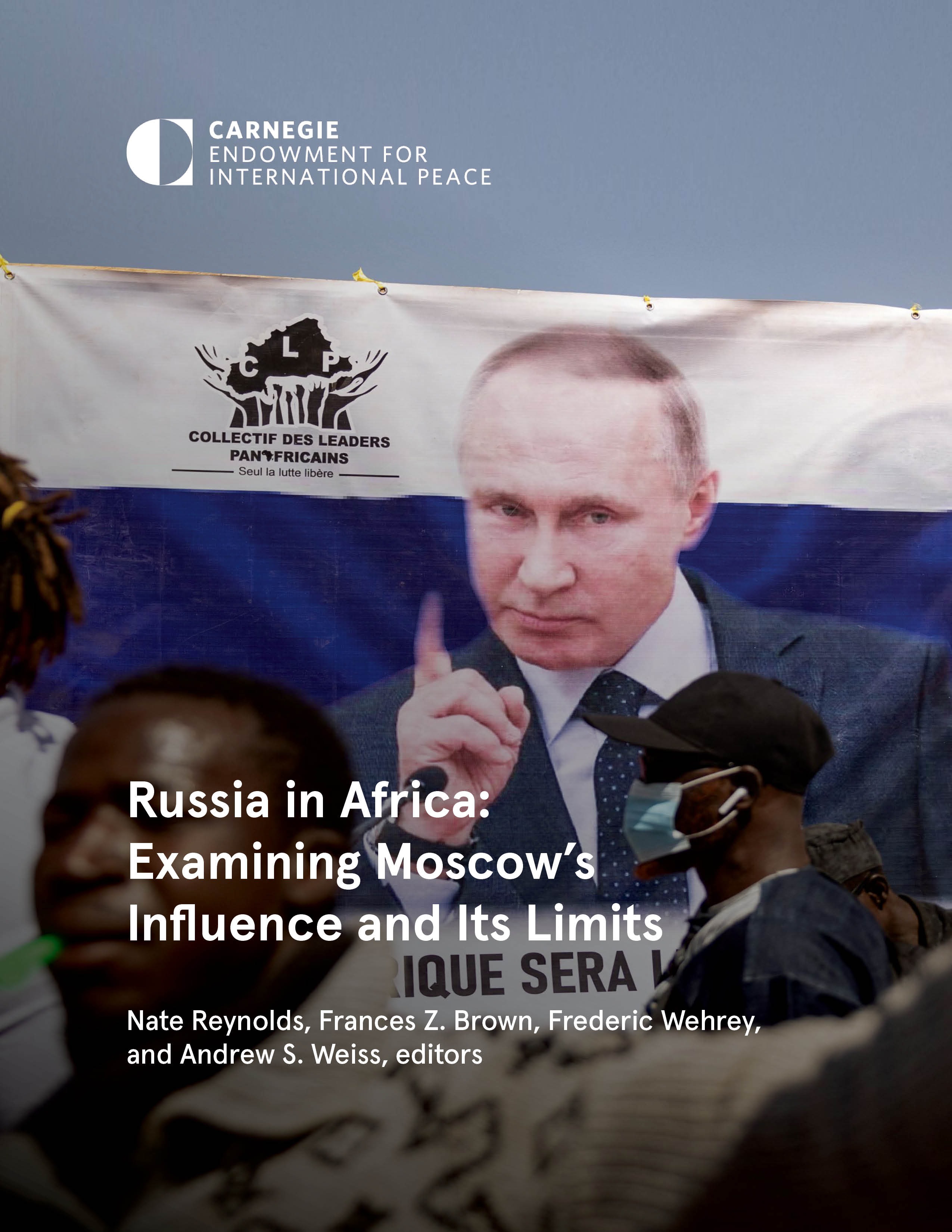Peter Kellner
{
"authors": [
"Peter Kellner"
],
"type": "commentary",
"centerAffiliationAll": "",
"centers": [
"Carnegie Endowment for International Peace",
"Carnegie Europe"
],
"englishNewsletterAll": "",
"nonEnglishNewsletterAll": "",
"primaryCenter": "Carnegie Europe",
"programAffiliation": "",
"programs": [],
"projects": [],
"regions": [
"United Kingdom",
"Europe"
],
"topics": [
"Foreign Policy",
"EU",
"Defense",
"Security"
]
}
Source: Getty
The Moment of Truth for a UK-EU Reset
Ahead of the UK-EU summit on May 19, London is aiming to reset its relations with Brussels by focusing on defense, migration, and trade. However, meaningful progress might be limited without a major revision of the post-Brexit deal.
From the battlefields of Agincourt and Waterloo to the conference tables of Versailles and Potsdam, the story of Britain’s place in Europe has been punctuated by moments when history changed course. Will the gathering of UK and EU leaders in London on May 19 be such a moment, or merely add to the long list of events when much was promised but little achieved?
British ministers have been sending mixed messages. On the one hand, Sir Keir Starmer, the prime minister, says he wants to “reset” UK-EU relations. Nick Thomas-Symonds, the minister in charge of negotiations day-to-day, is seeking a “new partnership with the EU.” The benefits that a deal could unlock are clear, he says: “reducing barriers to trade, driving economic growth and keeping us safe in an increasingly dangerous world.”
On the other hand, Thomas-Symonds also insists that “this will be framed by the very clear red lines we set out at the election.” The UK will remain outside of both the EU’s main economic structures: the single market and the customs union. Exclusion from these has imposed a 4 percent penalty on Britain’s productivity, according to the government’s official economic forecaster, the Office for Budget Responsibility (OBR). Rigid adherence to Thomas-Symonds’s redlines would leave that penalty in place.
Labour’s Post-Brexit Bind
In the run-up to politically charged events, such as the forthcoming UK-EU summit, participants tend to be coy about what they really hope to achieve and where they are willing to compromise. For Starmer, this is especially tricky and helps explain the mixed messages that ministers have been sending.
Before he became Labour leader in April 2020, Starmer opposed Brexit; indeed, he headed his party’s resistance to it and sought a second referendum so that voters could judge the eventual post-Brexit deal agreed on by the Conservative government. However, by the time he was elected party leader, the UK was outside the EU. Starmer decided that Labour should accept that outcome.
Indeed, he went further. He accepted advice from his polling advisers that any attempt to soften the terms of Brexit would cost Labour many of the votes it needed to return to government. As a result, Labour’s 2024 election manifesto shut the door on radical adjustments to the Brexit settlement.
In electoral terms, this strategy was successful. As Labour wanted, Europe scarcely featured in the election campaign. Despite obtaining a relatively low share of the vote, just 34 percent, Labour won almost two-thirds of the seats in the new parliament. Given the size of his victory, Starmer’s cautious stance on Europe seemed likely to hold, unchallenged, for the duration of his five-year term.
The calm did not last. Within four weeks of the election, Rachel Reeves, Britain’s chancellor, said there was “a £22 billion [€25 billion] black hole in Britain’s public finances.” In subsequent months, she raised taxes and curbed public spending. Her problems were exacerbated by Donald Trump’s reelection as U.S. president. Like other countries, the UK faced the danger of a slowdown in world trade and the need to increase defense spending.
All this put pressure on the government to speed up economic growth to improve public services, raise living standards, and avoid tax increases. In a television interview on May 8, Andrew Bailey, the governor of the Bank of England, could not have been clearer. Britain needed to “rebuild” its trade relationship with the EU and do “everything we can” to improve long-term trade.
One option—for many, the most obvious—is for Starmer to say the world has changed, the challenges are greater, and the UK needs to rethink its opposition to the single market, the customs union, and free movement with the EU. Without such a rethink, it is hard to reverse the costs of Brexit identified by both Bailey and the OBR. If the UK’s economy stalls, taxes are likely to rise and public services to suffer. Labour risks being badly beaten at the next general election. It is no surprise that some ministers, and most Labour voters, want a far closer relationship with the EU.
Some of Starmer’s closest advisers are resisting this. They point to the huge gains made by the pro-Brexit Reform UK party in the opinion polls and the local elections held on May 1. They argue that it would be politically fatal for Starmer to go back on his election promise.
In the run-up to the May 19 summit, Starmer’s political goal is to reconcile those positions. He wants to do as much as he can to improve relations with the EU without crossing his redlines. He also wants to keep open his options for future trade deals with the United States, building on the partial agreement he achieved with Trump on May 8. Starmer insists that he has no need to choose between Brussels and Washington.
UK Desires and EU Demands
Given all that, this is his wish list for the UK-EU summit.
The first priority is full access for the UK to the European Defense Fund. Under the rules of the EU’s proposed Security Action for Europe (SAFE) instrument, third countries can take part in EU defense procurement, but the draft regulation makes it hard for them to play more than a minor role without breaching the restrictions imposed by rules of origin. UK involvement in European defense should be attractive to EU leaders, because Britain is a nuclear power and has been a major player alongside other European nations in supporting Ukraine. But Starmer does need them to amend the draft SAFE regulation and make the UK a full member of these initiatives.
The second item on the wish list is for the UK to rejoin the EU’s crime and illegal migration database. Starmer sees this as a win-win deal, as sharing intelligence would enable both the UK and the EU to combat terrorism, criminal gangs, and illegal migration more effectively. Starmer would also like to revive Britain’s pre-Brexit right under the union’s Dublin Agreement to send back illegal migrants who arrive from EU countries—most notably France, from where thousands of asylum seekers arrive by boat each month.
Third, Starmer seeks to remove border checks and other barriers to trade in food, plant, and animal products. Brexit erected these barriers because the UK gained the legal ability to set different standards from the EU. In practice, little has changed, and Starmer is happy to commit to abide by these EU rules in order to remove all sanitary and phytosanitary (SPS) checks.
Finally, the prime minister wants greater freedom for British musicians and other performers to tour EU countries as well as mutual recognition of professional qualifications to allow British lawyers, bankers, and others to work across the EU.
Starmer is meeting resistance on all these issues. They come down to a mixture of specific national concerns and wider complaints that Starmer is trying to cherry-pick by seeking the benefits of a closer relationship with the EU without accepting the responsibilities of full membership.
One stumbling block is the fisheries deal in the 2021 UK-EU Trade and Cooperation Agreement. This gave EU boats defined rights to fish in UK waters. The deal was temporary; it expires next year. Britain’s fishing fleets want the new deal to be less generous to EU fleets. France’s President Emmanuel Macron opposes this. Fishing plays only a tiny role in Britain’s economy, but among pro-Brexit politicians and newspapers, it provokes feelings of nostalgia and flag-waving nationalism that Starmer would prefer not to offend. Yet, a BBC investigation in 2021 found that 55 percent of the quota handed to English fleets had been sold on to companies based in Iceland, the Netherlands, or Spain. In the end, Starmer may allow the 2021 agreement to be extended if that is the price for achieving a wider deal, especially on SPS checks, on May 19.
More serious is one of the EU’s main demands. Brussels wants more freedom for EU students to go to the UK and vice versa. British universities are keen on the idea; and more broadly, supporters argue that a relaxation of current rules would benefit research and innovation across Europe. The UK has already rejoined the EU’s Horizon research program but not its Erasmus program, which funds exchanges in education, training, and sports.
Within the UK government, there have been tensions between Reeves, who wants the economic benefits of the flow of students across borders, and Yvette Cooper, the home secretary, who fears that this could undermine her aim of reducing immigration. Her latest proposal is a “one in, one out” scheme, whereby the numbers heading each way would be equalized. She also wants strict limits on the time EU students could remain in the UK. The gap between this and the European Commission’s proposal is wide. A compromise on May 19 is likely but not certain.
Defense seems to be an obvious area for cooperation given the size of the UK’s armed forces, which have been much reduced in recent decades but are still a significant proportion of NATO’s strength in Europe. But revising the proposed SAFE regulation could be awkward. Full participation in the EU’s procurement program would, in effect, mean readmitting the UK into the single market and the customs union as far as defense production is concerned. This would benefit British industry and jobs. Would all EU states agree to this, or might they seek to extract a price in other areas of the negotiations? Ahead of May 19, intensive talks are taking place to reach an agreement.
Intelligence sharing on criminals and terrorists also touches deeper issues. Its components—the European Arrest Warrant, Europol, and the Schengen Information System—are designed specifically for EU member states. By choosing Brexit, the UK forfeited the benefits as well as the costs of being a member of the European club. The related issue of returning illegal immigrants who arrive in Britain from EU member states makes the matter even tougher. Progress looks likely to be limited without a much bigger revision to the post-Brexit deal between the UK and the EU.
Toward a UK-EU Grand Bargain?
So, will the summit on May 19 be a damp squib or the start of a transformation in UK-EU relations? The mixed messages from Starmer, who wants a bold reset but no violation of his redlines, leave his true long-term intentions unclear. But the wishes of the EU member states are no clearer, beyond a reluctance to spend time and political capital on negotiations that end up going nowhere.
A few months ago, that would have been the end of the story, with the UK living as best it can with Brexit and the EU having better things to do than haggle over significant changes. Maybe, just maybe, Trump’s erratic approach to tariffs, Western defense, and the war in Ukraine has created an opening for something bigger: a grand bargain between the UK and the EU that promotes the principles of free trade and a world order based on the rule of law and leads to a coalition of countries committed to upholding these principles.
In recent weeks, millions of people in different countries have commemorated the eightieth anniversary of VE Day—the end of World War II in Europe. By definition, it was also the eightieth anniversary of the start of the postwar world. The first few years of that world saw extraordinary innovations, as the foundations were laid for the UN, the World Bank, NATO, the EU, the World Trade Organization, and the European Court of Human Rights.
The self-serving and often cynical world of diplomacy does not have a good record of embracing big ideas. However, the EU’s forefathers managed to alter the course of history after 1945. Perhaps the biggest question just now is whether their combination of ambition, mutual self-interest, and moral vision can be revived.
About the Author

Peter Kellner
Former Nonresident Scholar, Carnegie Europe
Kellner was a nonresident scholar at Carnegie Europe, where his research focused on Brexit, populism, and electoral democracy.
- The UK Braces for a Change of DirectionCommentary
- Britain’s Two Main Parties Are TrappedCommentary
Peter Kellner
Recent Work
Carnegie does not take institutional positions on public policy issues; the views represented herein are those of the author(s) and do not necessarily reflect the views of Carnegie, its staff, or its trustees.
More Work from Carnegie Endowment for International Peace
- Is a Conflict-Ending Solution Even Possible in Ukraine?Commentary
On the fourth anniversary of Russia’s full-scale invasion, Carnegie experts discuss the war’s impacts and what might come next.
- +1
Eric Ciaramella, Aaron David Miller, Alexandra Prokopenko, …
- Indian Americans Still Lean Left. Just Not as Reliably.Commentary
New data from the 2026 Indian American Attitudes Survey show that Democratic support has not fully rebounded from 2020.
- +1
Sumitra Badrinathan, Devesh Kapur, Andy Robaina, …
- Taking the Pulse: Can European Defense Survive the Death of FCAS?Commentary
France and Germany’s failure to agree on the Future Combat Air System (FCAS) raises questions about European defense. Amid industrial rivalries and competing strategic cultures, what does the future of European military industrial projects look like?
Rym Momtaz, ed.
- Can the Disparate Threads of Ukraine Peace Talks Be Woven Together?Commentary
Putin is stalling, waiting for a breakthrough on the front lines or a grand bargain in which Trump will give him something more than Ukraine in exchange for concessions on Ukraine. And if that doesn’t happen, the conflict could be expanded beyond Ukraine.
Alexander Baunov
- Russia in Africa: Examining Moscow’s Influence and Its LimitsResearch
As Moscow looks for opportunities to build inroads on the continent, governments in West and Southern Africa are identifying new ways to promote their goals—and facing new risks.
- +1
Nate Reynolds, ed., Frances Z. Brown, ed., Frederic Wehrey, ed., …














